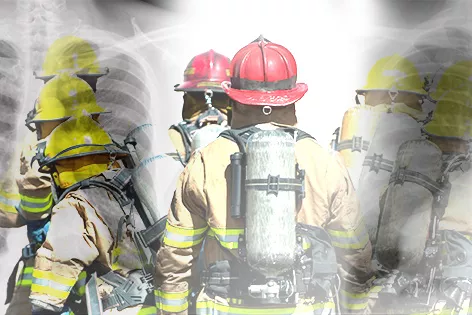July 29, 2019
PERMANENT FUNDING FOR 9/11 FIRST RESPONDERS AND SURVIVORS SIGNED INTO LAW
Signed into law, the Never Forget the Heroes: James Zadroga, Ray Pfeifer, and Luis Alvarez Permanent Authorization of the September 11th Victim Compensation Fund Act extends a funding deadline for victims from December 2020 to October 2090, granting permanent funding for the duration of the survivors’ lives. The law removes a total dollar amount for the fund, ensuring that monetary awards will be provided as needed. Read more.
Zadroga Act Broadened the 9/11 VCF
The United States government opened the original September 11 Victim Compensation Fund (VCF I) in response to the horrific acts of terrorism on September 11, 2001. This fund went to support the children, parents and spouses left behind by the 9/11 victims and was closed in 2004. Nine years after 9/11, the fund was re-authorized by Congress and reopened in response to the growing number of first responders, clean-up workers and residents who began suffering from a number of different illnesses, including cancer and lung diseases, and dying years after being exposed to toxic chemicals and carcinogens at the attack sites.
Originally named “The James Zadroga 9/11 Health and Compensation Act of 2010” in honor of the late James Zadroga—a New York City police officer and 9/11 first responder whose death from respiratory disease was the first attributed to 9/11 toxin exposure—the Zadroga Act broadened the scope of the Victim Compensation Fund, enabling more people who suffered physical injury, illness or death as a result of the 9/11 attacks to obtain economic relief through the program.
Among those eligible for the 9/11 Victim Compensation Fund (VCF II) are:
- Canal Street area residents
- Cleanup workers
- Construction and sanitation personnel
- First responders
- Individuals who worked or volunteered in the areas of the three crash sites
Originally set to expire in December 2020, Congress voted in July 2019 to extend the Victim Compensation Fund to October 2090, granting permanent funding for first responders and survivors. Re-named the Never Forget the Heroes: James Zadroga, Ray Pfeifer, and Luis Alvarez Permanent Authorization of the September 11th Victim Compensation Fund Act, the law removes a total monetary cap for the fund, promising to fund awards as needed.
9/11 Toxic Exposure Side Effects and VCF Eligibility
In a decision announced just one day before the 11th commemoration of 9/11, federal authorities added 58 types of cancers to the list of illnesses covered by the new Victim Compensation Fund. These cancers include, among others:
- Bladder
- Blood
- Bone marrow
- Breast
- Colon
- Esophageal
- Kidney
- Lung
- Skin
- Thyroid
- Trachea
The full extent of health consequences resulting from 9/11 toxic exposure are still unknown, but many victims have been diagnosed with health problems such as:
- Acid reflux disease
- Chronic bronchitis
- Chronic obstructive pulmonary disease (COPD)
- Obstructive airway diseases
- Obstructive lung defects
- Occupational asthma (WTC Cough)
- Reactive airways dysfunction syndrome (RADS)
- Upper or lower airway disease
On Feb. 1, 2014, the WTC Health Program announced it will consider certain blood or bone marrow disorders as covered health conditions that are eligible to members for treatment. As in past additions by the WTC Health Program, we anticipate the 9/11 VCF to consider these modifications to the list of covered conditions.
Please note that if you already applied to the original Fund and received compensation for your injuries, you may not be eligible to re-apply to the new Victim Compensation Fund unless you can show that your injuries have substantially worsened or are different, new injuries.
9/11 Victim Compensation Fund Deadlines
In September 2016, the Department of Justice announced that it would extend its Victim Compensation Fund eligibility deadline for those known to have developed cancers linked to their exposure to toxic air and dust at the World Trade Center on 9/11/01. Instead of enforcing a two-year registration deadline that started from the date of diagnosis, the agency now, in most cases, starts from the day eligible victims were notified by a federal, state or local government official that their cancer was caused by WTC exposure. Generally, claimants are now considered to have registered on time if their registration is submitted within two years of the date they were notified. Read more on registration and claim filing deadlines.
For more information, visit www.vcf.gov/deadlines.
World Trade Center Health Program
The 9/11 Victim Compensation fund also established the World Trade Center Health Program (WTC Health Program) for the purpose of providing “medical monitoring and treatment for responders at the WTC and related sites in New York City, the Pentagon, and Shanksville, PA, and survivors who were in the New York City disaster area.” The WTC Health Program provides valuable research regarding the health impacts of the 9/11 attacks and regularly updates the types of conditions eligible for treatment under the program.
In the consolidated lawsuit In re September 11 Litigation, Motley Rice anti-terrorism lawyers represented and settled the claims of 56 of the 96 families who opted out of the original 9/11 VCF to pursue claims against aviation and security companies. In addition to providing greater answers, accountability and recourse to victims' families, the litigation helped provide public access to evidence in an archive of selected discovery materials gathered in the litigation.
Read more about Motley Rice Anti-Terrorism Litigation

